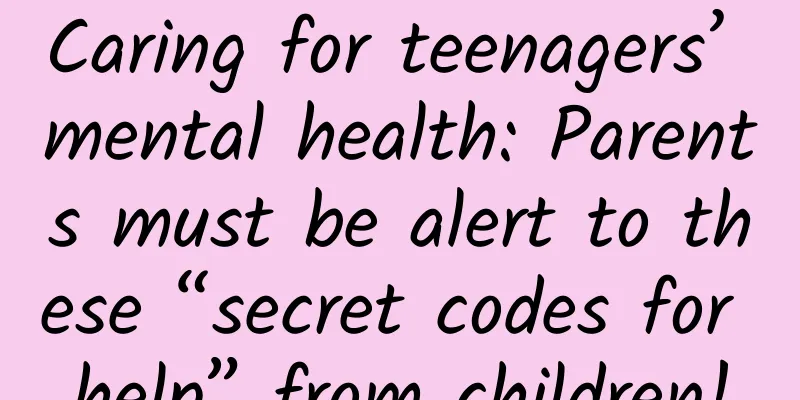Caring for teenagers’ mental health: Parents must be alert to these “secret codes for help” from children!

|
Recently, Jiangxi police reported the investigation of the disappearance of Hu Xinyu, a freshman in Qianshan County, Jiangxi Province. They determined that Hu Xinyu committed suicide and the place where his body was found was the original first scene. According to the psychological description of Hu Xinyu by psychological experts in the official report, he had many mental health problems, including emotional problems such as guilt, pain, helplessness and meaninglessness, sleep problems such as difficulty falling asleep, waking up early and difficulty falling asleep again after waking up, cognitive disorders such as difficulty concentrating and memory, abnormal eating, clear manifestations of world-weariness and suicidal tendencies, etc. These problems are not only the most common manifestations of psychological disorders among adolescents, but also the typical symptoms of depression . According to the survey results of the "China National Mental Health Development Report (2019-2020)" published in 2021, 24.6% of adolescents suffer from depression , of which 17.2% suffer from mild depression and 7.4% suffer from moderate depression, which means that about 25 out of every 100 adolescents suffer from depression to varying degrees . The proportion of nearly a quarter shows that adolescent mental health problems are extremely common. The report also found that the detection rate of depression will increase with the grade. In high school, about 37% of adolescents suffer from mild or above depression , which is a data that should not be underestimated. Image source: "China National Mental Health Development Report (2019~2020)" The World Health Organization's report shows that suicide is the second leading cause of death among young people. Among China's youth population, about 17.7% have suicidal intentions , suicide accounts for 6.1% of the causes of death among young people, and about 60% of suicidal young people suffer from depression. It is said that "young people do not know the taste of sorrow". These data are a wake-up call for parents who hold this idea. While paying attention to their children's academic achievements, they should not ignore their children's mental health issues, especially depression. 01 What are the signs of depression? A study in China shows that the average delay in seeking help for adolescent depression patients is 17 months . In other words, during this period of approximately one and a half years, they have been silently suffering from depression without actively seeking help. Pay attention to your child's functional performance Studies have found that most adolescents with depression will experience varying degrees of decline in academic performance and efficiency , as well as cognitive impairments such as difficulty concentrating and memory . If parents find that their child's grades have suddenly dropped, although the reasons behind this may be varied, if the decline in grades continues for a period of time and is accompanied by aversion to school, incomplete homework, distraction in class, and internet addiction, then parents should be alert to whether their child is depressed . Pay attention to your child's sleep Adolescents with depression often experience a series of sleep disorders such as difficulty falling asleep, waking up early, and difficulty falling asleep after waking up . Although it is difficult for parents to directly observe their children's sleep conditions, sleep problems are often reflected in their children's daily state. If it is found that the child always yawns, oversleeps, is in a poor mental state, is irritable, etc., this is most likely caused by insomnia, which often implies that the child's mental state is poor. Pay attention to your child's emotional state Patients with depression often show a series of negative emotions , which is the most dangerous signal leading to adolescent suicide, including excessive self-blame and guilt, feeling that life is meaningless, losing interest in many things, often feeling isolated and helpless, crying more than usual, etc., and sometimes even blurting out some negative words such as self-harm and suicide. These negative emotions are always tied to the patient's daily life events. Parents can find out whether their children have a tendency to depression by understanding their children's attitudes and behaviors towards daily events. It should be noted that teenagers are often in a rebellious period and are not very willing to express their true feelings or "report good news but not bad news." Although this is a common situation, it also reflects the closeness of the parent-child relationship and cannot be simply attributed to the child being in a rebellious period. Studies have also found that alienated parent-child relationships are often an important cause of adolescent depression . Beware of "smiling depression" in children In order to maintain the image of a "good child" or because they don't want to worry their parents, children may always maintain a sunny and positive image in front of their parents, deliberately concealing their emotions and forcing themselves to smile. However, psychological depression is real , and when children are under too much pressure, their mental state may deteriorate. Understanding your child’s social interactions Adolescents' social interactions may be the cause of depression or one of the symptoms of depression. If parents find that their children are withdrawn, avoid socializing, are taciturn, have tense interpersonal relationships, or suffer from school violence , these indicate that their children may be in poor mental state and are at risk of depression. Pay attention to your child's physical condition Patients with depression often have poor appetite and may overeat . When a child's eating or weight changes dramatically, after excluding the possibility of physical illness, parents should consider the possibility that the child suffers from a psychological disorder. In addition, parents should also pay attention to whether the child has a tendency to self-harm or attempt suicide , which are symptoms of severe depression. For example, the most common self-harm is cutting the arm, as well as hitting, pinching, and bumping, or finding that the child has bought books and tools about suicide and death. From the above description, it is not difficult to find that the manifestations of depression are very wide and may affect all aspects of the child. As long as parents pay attention and communicate with their children more, they can easily feel that their children's "mental state is not right." 02 How should parents respond to their children's signs of depression? Active care and communication When parents discover that their children have signs of depression or have detected their signals for help, they must not ignore or blame them, and continue to add pressure to their children. Instead, they should actively communicate with their children, choose to listen more instead of condescendingly teaching them, and show unconditional care and support in the process of listening to their inner thoughts. They should try their best to understand their children and let them know that their parents will always be their warmest support. -Abandon crude "preaching" and "blind persuasion" For many parents, facing a depressed child, they may not have the corresponding counseling and treatment capabilities, and in many cases , a tense or alienated parent-child relationship is itself one of the causes of a child's depression . "Blind advice" that "thinks the child is just temporarily depressed" will have the opposite effect, aggravating the child's depression and suicidal tendencies. Therefore, what parents should do most is the active care and communication mentioned in the previous point, truly listening to and understanding the reasons and thoughts of the child's depression, rather than imposing their own understanding and rough practices. Seek professional help Early detection and early intervention of adolescent depression are the most important, so once a child is found to be depressed, professional help should be sought, such as from a hospital psychiatric department . At the same time, parents should also do a good job of psychological work for their children, communicate with them patiently, and help them overcome the stigma of illness. For example, they can tell their children that "physical illness will cause mental discomfort, and you should still see a doctor. This is not something shameful and is completely normal", so that children can willingly accept psychological treatment. Parents should also follow the doctor's advice A notable feature of depression is that it recurs. Studies have found that even after treatment, the probability of adolescent depression recurring is as high as 40%, and the probability of subsequent recurrence is 50% . Moreover, depression requires continuous efforts from adolescents, therapists, and parents. During and after treatment, according to the guidance of therapists, improving parent-child relationships and education methods, children can gradually restore their mental health, adapt to life with the right attitude and method, and try to avoid recurrence of depression. In summary, adolescence is a period of high incidence of mental health problems, especially depression, which has a high prevalence rate. Severe cases may lead to the recurrence of incidents similar to Hu Mouyu's suicide. Therefore, it is extremely important for parents to pay active attention to their children's emotions and mental state, promptly detect their children's depression symptoms and help-seeking signals , and intervene as early as possible. References: [1] Fu Xiaolan, Zhang Kan, Chen Xuefeng, & Chen Zhiyan. (2021). Mental Health Blue Book: China’s National Mental Health Development Report (2019-2020). Beijing: Social Sciences Academic Press. [2] Cheng Wenhong, Liu Yi, Fan Juan, Tang Huiqin, Li Min & Wang Zucheng. (2006). Help-seeking behavior of adolescents with depression and their parents. Chinese Journal of Clinical Psychology (06), 606-608. [3] Ding Wenqing, Zhou Miao & Song Fei. (2017). Meta-analysis of the mental health status of Chinese school-age children and adolescents. Journal of Ningxia Medical University (07), 785-791+795. [4] Cheng Shuying, Liu Wei & Yuan Jie. (2011). Investigation of first visit status and analysis of clinical characteristics of adolescent depression. Chinese Journal of Health Psychology (11), 1314-1316. [5] Song Lili. (2019). Investigation and study on the pathogenic factors and preventive measures of adolescent depression. Continuing Medical Education (04), 85-86. [6]Melvin, GA, Dudley, AL, Gordon, MS, Ford, S., Taffe, J., & Tonge, BJ (2013). What happens to depressed adolescents? A follow-up study into early adulthood. Journal of Affective Disorders, 151(1), 298-305. Author: ACC Psychological Science Reviewer: Tang Yicheng, Deputy Director of Beijing ACC Psychological Health Promotion Center |
<<: Frequently asked questions and answers about HPV vaccination, please bookmark and forward!
Recommend
Picture of gestational sac at 20 days of pregnancy
The body of a pregnant woman will not change imme...
Grains on nipples after pregnancy
After pregnancy, the mother's body will under...
What should we pay attention to during secondary flow
If you do not pay attention to contraception or c...
How do I apply for a health code for primary school students? Where can I check my travel code for primary school students?
The health code is based on actual data. Citizens...
What disease is it that causes leucorrhea that looks like tofu dregs?
No woman wants to suffer from gynecological disea...
Is it normal to have menstruation again after two years of amenorrhea?
As we all know, women usually go through menopaus...
How many days of menstruation are considered normal?
Menstruation is something that every woman has ex...
Can I drink water in the morning when doing a glucose tolerance test?
Do I need to drink water before doing a glucose t...
Why is there less fetal movement in the seventh month of pregnancy?
We all know that women have officially entered th...
What are the symptoms of female cysts?
As a woman, you are often affected by various gyn...
Revealing the five main reasons why you get stomach pain when doing sit-ups!
Sit-ups are the fastest and most effective way fo...
The specific reason why women have pain on the left side of their lower abdomen
There are many reasons for abdominal pain. Some w...
What does it mean when a woman closes her eyes?
Many women have the problem of O-shaped legs, esp...
What medicine should I take for bloody vaginal discharge?
"My leucorrhea today was bloody. I thought i...
Is surgery necessary for ectopic pregnancy?
If you experience abnormal severe abdominal pain ...









